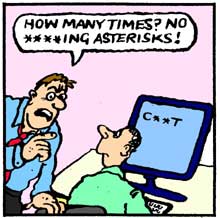Avoiding the asterisks … of avoidance
Quelques remarques au sujet des gros mots dans la presse. Et comment éviter les astérisques d’évitement.
The software upgrade seems to have gone all right (please report any problems you may have with this site). Posting, on the other hand, has been light; mainly because I’m recovering from a particularly tenacious cold/cough/bronchitis, which has me look at the more substantial posts in the pipeline and shake my head in disgust about their lack of clarity and conciseness.

To tide you over, some more levity. The language blogs have been abuzz with posts about swearwords lately — their origins, their usages, and the annoying tendency of some media to censor, edit or otherwise partially camouflage the offending words, blatantly disregarding the speakers or authors who chose them in the first place. (Search engines still have problems retrieving the appropriate posts, but for a small sample, try this and this Technorati search — I just can’t get their Boolean operators to work correctly.)
In the latest instalment of this meta-series, Arnold Zwicky approvingly cites the Guardian, whose editors have no problem printing relevant quotes in full:
Sir Richard [Mottram] put it more succinctly. He is said to have told a colleague: “We’re all fucked. I’m fucked. You’re fucked. The whole department’s fucked. It’s been the biggest cock-up ever and we’re all completely fucked.”
The Guardian Style Guide — always a pleasant read, and at the very least you’ll enjoy the cartoons (see above) — has the following to say:
fuck
do not describe this as “a good, honest old-fashioned Anglo-Saxon word” because, first, here is no such thing as an Anglo-Saxon word (they spoke Old English) and, more important, it did not appear until the late 13th century
see swearwordsswearwords
We are more liberal than any other newspaper, using words such as cunt and fuck that most of our competitors would not use.
The editor’s guidelines are straightforward:
First, remember the reader, and respect demands that we should not casually use words that are likely to offend.
Second, use such words only when absolutely necessary to the facts of a piece, or to portray a character in an article; there is almost never a case in which we need to use a swearword outside direct quotes.
Third, the stronger the swearword, the harder we ought to think about using it.
Finally, never use asterisks, which are just a copout.
Asterisks are explicitly forbidden. Very sensible advice.
On the same topic, when I was talking about this sort of thing with my friend Kareen some time ago over a pleasant cup of tea under her plum trees, I was reminded that the asterisks, periods or underscores of avoidance aren’t an English-only phenomenon. In 1947, Jean-Paul Sartre published a play called La P… respectueuse. “P…” stands for “Putain”, whore. Here, the avoidance is achieved with a standard ellipsis: three dots, which according to French typographic rules are printed without a preceding blank space. The number of dots does not equal the number of elided letters. Kareen surmised that literary scholars and the like would refer to the play as “La Putain respectueuse”, though.
Related posts: On fuck and Marmite, Amuse-bouche to zaibatsu, For the danglers..., Euphemism of the day: concertina wire, Today's interminable NPs , Etymologically incorrect, Minimalist Kitkat
Technorati (tags): anglais, censorship, English, language, langue, swearing, taboo language

